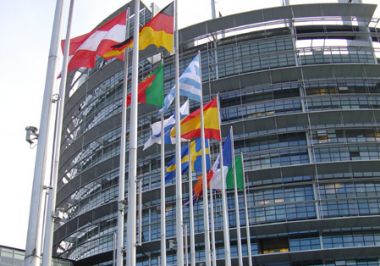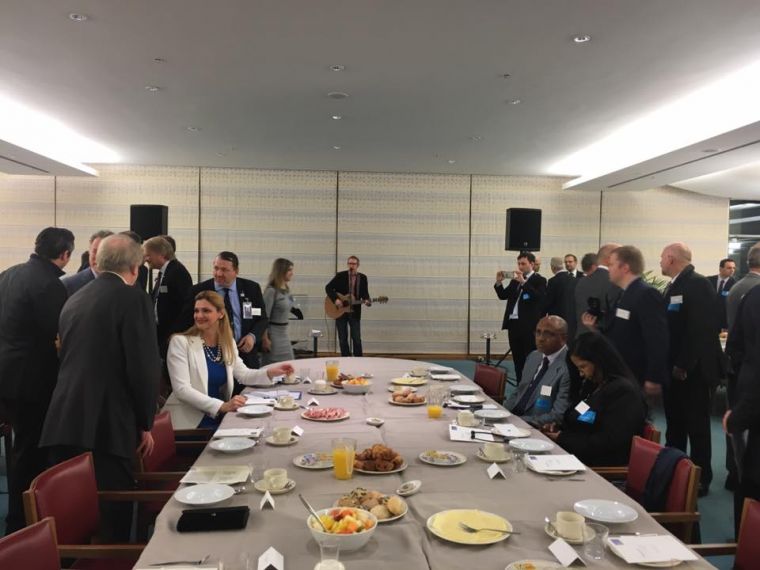Singing In The Wrong Cathedrals: Why The Church Has To Be In The Public Square

Last week I sat in two cathedrals. They were at either end of Brussels. One was the majestic cathedral of St Michael and St Gudula, whose sheer imposing height takes your breath away, even in a city where many buildings do that. The other was the European Parliament – a cathedral of democracy in its own way, even though its history is as patchy as much of the European Church.
Ironically I had the privilege of leading worship and speaking not in the ancient cathedral but the newish one. The context was the European Parliamentary Prayer Breakfast where MEPs, staff members, and other civic leaders from all over Europe came together to share fellowship and pray together. Impressively this was a prayer breakfast where there actually was some prayer alongside the breakfast.
It seemed appropriate to lead everyone in a 'civic hymn' that Noel Robinson, Graham Hunter and I wrote this year. It uses the famous tune of 'Abide with me'.
We seek your kingdom throughout every sphere
We long for heaven's demonstration here
Jesus, your light shine bright for all to see
Transform, revive and heal society
Before all things, in him all things were made
Inspiring culture, media and trade
May all our work serve your economy
Transform, revive and heal society
Peace, truth and justice reigning everywhere
With us be present in our public square
Fill all who lead with your integrity
Transform, revive and heal society
Forgive us Lord, when we have not engaged
Failing to scribe your heart on history's page
Make us again what we were made to be
Transform, revive and heal society
Faithful to govern ever may we be
Selfless in service, loving constantly
In everything may your authority
Transform, revive and heal society
We wanted to write something that reminded us of our call to bring transformation in public life, grounded in the context of God's ultimate sovereignty. It was amazing to see how all these European leaders responded to it. "Finally", they said, "words that speak to our context. So often the words we sing feel so separate from our daily lives. This feels like the sacred and secular coming together."
It was striking that in the European Parliament, there was such an open door to pray and worship. At the breakfast, there were explicit testimonies of personal faith and direct challenges that are not so common at similar events in Washington or Westminster. One prime minister spoke powerfully of his conversion from atheism to Christianity and his subsequent call to political life. One of his most interesting contributions was that he feared Europe had backslidden from its original calling.
The whole experience got me wondering if we as the Church have spent too long singing in the wrong cathedrals. Should we be more focused on being present to God and lifting up his name in the sanctuary of our office space, or the holy ground of our kitchen?

The light is so often hiding under a bushel and blaming the darkness for existing. Darkness is dark. Haranguing it from a distance doesn't make it brighter. Light makes it brighter. The light that came streaming into St Michael's Cathedral through glorious stained glass windows like a rainbow created a holy moment, but how is being a window in a council chamber, board of governance or any other 'cathedral' near you, creating moments just as holy?
As Mark Greene from LICC often says, the sacred/secular divide debate has been won by a different theologian in every decade since the second world war (you can trace Stott, Newbigin etc). But he continues that this theological victory has never led to a functional change in the Church. All our resources and staffing still point towards putting on the best show possible on a Sunday morning, rather than resourcing our people meaningfully for the challenging environments into which they step on a Monday.
This is about both liturgy and location.
So in terms of our liturgy, where is the vocabulary of the voluntary sector? Where is the language of labour? Where is the poetry of the parliamentary? Who like the psalmist David is writing of the nuts and bolts of their daily life, from the mundanity of herding to the glories and failures of grand battles? Our civic hymn is just one attempt to get the ball rolling.
And in terms of location, in Brussels I met some incredible people singing the Lord's song in what for them is still a strange land. They don't claim to be experts at it like we Brits and Americans often do, offering our expertise to the world, but they are giving it a go. There were pastors turned politicians, navigating the territory of their new cathedral, leading worship in a different way. They humbled me with their stories of personal sacrifice in standing up to oppressive regimes, of escaping communism, and bringing reconciliation in the Balkans.
The building of a cathedral, especially in the Middle Ages, was a project in which the entire town took part. In this post-Christendom age we obviously don't have everyone in our towns constructing places of worship, so it leads me to ask a question. Rather than spending so much of our personal and financial resource "building the house" with other believers, should we not be finding other things to build alongside 'the whole town'? Rather than build ever bigger buildings with ever more impressive PA systems for a God who does not dwell in dwellings made by man, could we be involved in some kingdom-building with our God out amongst civic society?
In 2017, let's give some thought to where and what we're singing.
Andy Flannagan is a London-based, Irish singer-songwriter who was previously a hospital doctor. He is also the Director of Christians on the Left.











